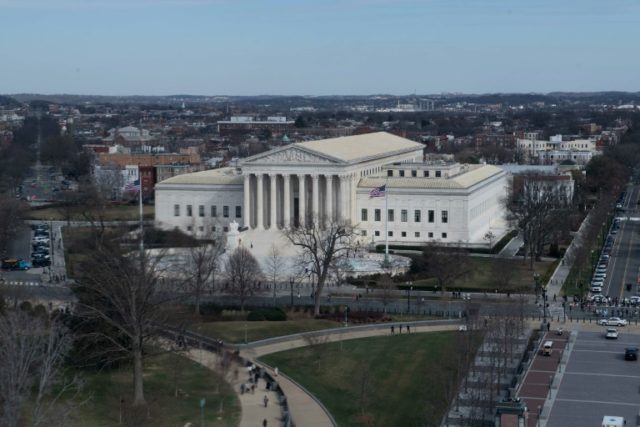Washington (AFP) – A day after Californians protested the latest police shooting of an unarmed black man, the US Supreme Court signalled Monday that law enforcement officers are generally protected against accusations of excessive force.
The court rejected arguments that an Arizona officer had broken the law in 2010 when he shot and wounded a woman standing in her driveway holding a kitchen knife.
Amy Hughes, who testimony showed was far away from police officers and did not threaten them, accused them of violating her constitutional right against unreasonable searches and seizures.
Echoing past rulings, the court sided with University of Arizona police officer Andrew Kisela, ruling that he enjoyed, as part of his job, “qualified immunity” in the case.
But two of the nine justices objected strongly to the decision, saying it “sends an alarming signal” that police are usually protected against accusations of unjustified shootings.
– Shot four times –
Hughes was shot in May 2010 after three officers responded to a call of a person hacking on a tree with a large knife.
When they arrived, they saw Hughes, a woman who had been diagnosed with bipolar disorder, carrying a kitchen knife, not pointing it at anyone but moving toward her roommate Sharon Chadwick.
Police, who were on the other side of a chain-link fence and so not threatened, shouted at Hughes to drop the knife. When she didn’t, Kisela shot her four times.
Hughes later sued Kisela for violating her rights, but the lower court sided with the police officer, ruling his actions were reasonable and protected by qualified immunity.
That was reversed in appeals court, where a judge said Kisela had no grounds to believe Hughes posed an imminent threat to anyone, and that no one had reported a crime.
Kisela then appealed to the Supreme Court, which backed him Monday. The court ruled that Kisela had not violated Hughes’ rights, given what he knew and saw at the scene.
“Although the officers themselves were in no apparent danger, (Kisela) believed she was a threat to Chadwick” and had “mere seconds to assess the potential danger,” the judges ruled.
Acknowledging a “hazy border between excessive and acceptable force,” the court said that for police, “immunity protects all but the plainly incompetent or those who knowingly violate the law.”
– Anger over police shootings –
But the ruling had the potential to inflame pent-up anger over the frequency of US police shootings of unarmed people.
On Friday a Baton Rouge, Louisiana police officer was fired but not otherwise punished for the 2016 shooting of Alton Sterling, a 37-year-old black man.
Sterling, never accused of any crime, was accosted by police in front of a convenience store where he had been selling CDs, pushed to the ground, shot with a Taser and then shot six times with a gun.
On Sunday demonstrators in Sacramento protested the March 18 killing of 22-year-old Stephon Clark, as he walked through his grandmother’s yard, holding a cellphone.
An autopsy showed he was shot eight times, mostly in the back, by officers investigating car thefts.
Dissenting in the Hughes case Monday, Supreme Court Justice Sonia Sotomayor said the decision gives police too much discretion for using their guns.
The court majority’s decision “sends an alarming signal to law enforcement officers and the public. It tells officers that they can shoot first and think later, and it tells the public that palpably unreasonable conduct will go unpunished,” Sotomayor said.

COMMENTS
Please let us know if you're having issues with commenting.